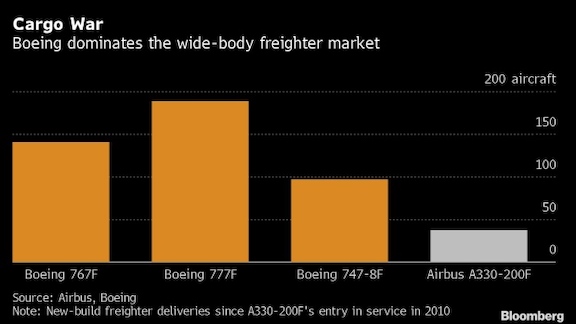Airbus set to move ahead with A350 freighter within weeks
Airbus SE is poised to begin taking orders for a freighter version of its A350 wide-body as soon as next month, in a challenge to Boeing Co.’s dominance in the market for dedicated cargo aircraft.
The European planemaker has been speaking to more than a dozen potential customers and will seek board authorization to market the new plane in the coming weeks, provided it can line up enough commitments, according to people familiar with the matter. The program could officially launch by year-end, said the people, who sought anonymity discussing confidential matters.
Going after a segment where Boeing has long held sway would mark a major strategic push for Airbus. Chief Executive Officer Guillaume Faury told Bloomberg News in April that he’s keen to challenge his U.S. rival and that the A350, a modern, lightweight plane with carbon-fiber wings and hull, would be “a strong candidate” for a freighter.
“Leaving Boeing in an unrivaled position is a little dangerous for Airbus,” said Jefferies analyst Sandy Morris. “It’s as much about addressing spots where your competitor is strong as it is about addressing weaknesses.”
The cargo version would be based on a modified A350-900 and may be slightly longer than the passenger version, according to the people. It would take several years to secure regulatory approvals and enter service.
An Airbus spokesman said that the company is always discussing new products with its customers and “not all studies see the light of day.”

Uphill Battle
Airbus, based in Toulouse, France, has established a lead over Boeing in the market for narrow-body passenger aircraft, but has long lagged behind in bigger, more expensive twin-aisles. Boeing has built on its strength in larger planes with freighter versions of its 777, 767 and outgoing 747 models.
While most dedicated freighters are older passenger jets converted for cargo use, some major carriers like United Parcel Service Inc. and Fedex Corp. buy new ones for their fleets. Boeing said in its latest commercial market outlook that it sees demand for 2,430 freighters in the next 20 years, with 930 purpose-built and the remainder modified passenger aircraft.
Airbus has had little success with earlier attempts to shake Boeing’s hold on this market. A cargo version of the smaller A330, which entered service in 2010, has garnered just 38 sales. An attempt to set up a freighter program with the A380 super-jumbo collapsed during the same era amid a lack of demand.
The A350 would face the same hurdles as it targets the larger end of the segment, likely going up against Boeing’s 777 or its successor, the 777X, should Boeing decide to move forward with a cargo version. For Airbus, the launch timetable is dependent on securing several customers.
Customer Hurdle
The company is focusing its efforts on the U.S., and Airbus commercial chief Christian Scherer has met with FedEx Chairman Fred Smith to pitch the plane, the people said. The planemaker is also pursuing UPS, the people said. Both delivery companies declined to comment.
Potential customers also include Qatar Airways, which has said it is weighing a possible order for at least 30 freighters from either Airbus or Boeing. In recent weeks, Qatar Airways CEO Akbar Al Baker has escalated a dispute with Airbus over issues under the surface of the paint on A350s. The outspoken executive has publicly excoriated planemakers in the past while pressing them for concessions over aircraft.
Other obvious targets are Deutsche Lufthansa AG, which has a dedicated cargo unit, and Singapore Airlines Ltd., with 55 A350s in its fleet.
Qatar Airways declined to comment. Singapore Airlines and Lufthansa couldn’t immediately be reached for comment.
Collapse in Demand
The A350, Airbus’s most advanced twin-aisle, has been hurt by a collapse in demand for bigger jets caused by the coronavirus pandemic, while use of dedicated cargo jets has surged.
There’s some concern the freighter boom could subside after air travel returns, because more capacity will be available for goods carried in the bellies of passenger jetliners. There are also hundreds of airliners that have been retired during the pandemic and can be converted for cargo.
Airbus is betting that the A350’s fuel efficiency and cleaner emissions profile will make it an attractive choice for enough customers to make the program worthwhile. The company may also be seeking to capitalize on Boeing’s production issues with the 777X, which could delay the planned freighter version and allow Airbus to launch its model first.
Similar Stories

Inauguration of the Fly’in technology center: Daher paves the way for the future of decarbonized aviation
View ArticleHorizon Aircraft signs Letter of Intent with Discovery Air Chile Ltda., expanding global presence of Cavorite X7 Hybrid eVTOLs
New Horizon Aircraft Ltd. (NASDAQ: HOVR), doing business as Horizon Aircraft (“Horizon Aircraft” or the “Company”), a leading hybrid electric Vertical Take-Off and Landing (“eVTOL”) aircraft developer, announced today it…
View Article
WorldACD Weekly Air Cargo Trends (week 1) - 2025
View Article
Lufthansa Cargo exhibiting at Fruit Logistica 2025
View Article
A flying start to 2025 but after 14 months of double-digit demand growth, air cargo stakeholders remain cautious
View ArticlePharma.Aero expands global network with six key new members
CEVA Logistics, Skandi Network, SCL Cold Chain, Shipex NV, Pharming Group, and ARTBIO join the life sciences logistics collaborative platform
View ArticleGet the most up-to-date trending news!
SubscribeIndustry updates and weekly newsletter direct to your inbox!





